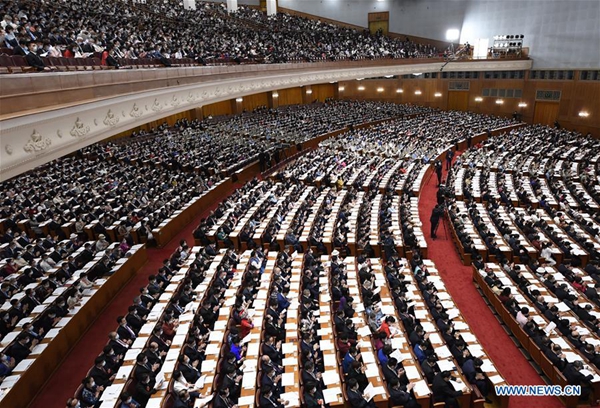NPC deputies weigh in on grassroots medical services
- By Qin Qi
 0 Comment(s)
0 Comment(s) Print
Print E-mail China.org.cn, May 28, 2020
E-mail China.org.cn, May 28, 2020
The COVID-19 outbreak has put public health at center stage during this year's "two sessions," the annual sessions of the National People's Congress (NPC) and the Chinese People's Political Consultative Conference (CPPCC) National Committee. During the weeklong sessions, legislators and political advisors across China convened in Beijing to discuss the country's political and legislative affairs. One particular topic of discussion and debate among NPC deputies is the capacity to protect public health at the grassroots level in the country's hospital system.

According to a tally in March, 95% of China's 100,900 medical institutions belong to the grassroots category, which are located throughout urban communities and rural areas.
Mao Zongfu, a deputy to the 13th NPC and director of Wuhan University Global Health Institute, said the role of grassroots medical institutions is vital. "Community-based health governance model is an important foundation for Wuhan's victory of the COVID-19 battle," Mao said.
According to Mao, grassroots medical institutions in the city have shouldered a lot of responsibilities since the outbreak. Their jobs included screening and treating COVID-19 patients, visiting people who had close contact with the patients, disinfecting their homes, and epidemiological investigation and data collection.
Meanwhile, grassroots medical institutions faced challenges beyond helping the public, as they struggled to secure sufficient equipment and supply to protect themselves.
Ma Wenfang, a deputy to the 13th NPC and a veteran rural doctor in Henan province, saw firsthand the shortage of emergency supply during the initial outbreak. As he visited fellow villagers, especially those who had been traveling and could have been infect, Ma said he had only thin masks and a white gown to wear.
"It was quite scary," he said. Aside from the basic face masks, rubbing alcohol was the only type of medical supply the village could get from his rural clinic.
During the two sessions, Ma called on the country to invest more in rural medical infrastructure. "Only when it is well prepared in normal times, grassroots medical institutions can join in the fight once an outbreak occurs," he said.
Community medical institutions in the cities also faced similar problems. Gu Jin, a deputy to the 13th NPC and president of Peking University Shougang Hospital, said that tertiary hospitals -- the country's top-level hospitals -- should have closer ties with community medical institutions.
"Tertiary hospitals are usually under the municipal authority while community medical institutions are under district authority, thus information cannot be shared smoothly, nor personnel redistributed according to needs," Gu said.
In Gu's case, four community health service centers and five service stations are affiliated with Shougang Hospital. This had allowed the hospital to assist the affiliated community health facilities when they were lacking medical supplies.
He suggested breaking the institutional barriers between the higher-level hospitals and community medical facilities, which would unify staffing management and information sharing systems.
Some deputies to the 13th NPC have seen the potential of cutting-edge technology in addressing the country's public health problems. Liu Qingfeng, a deputy to the 13th NPC and president of artificial intelligence company iFLYTEK, suggested that grassroots medical capacities could be improved through artificial intelligence.
According to Liu, a type of AI-assisted diagnostic technology has been in use in Anhui province since 2018 at 14,000 grassroots medical institutions, benefitting more than 40 million people.
During the COVID-19 pandemic, AI-assisted automated calling were used to reach 59 million people across China, finding 36,000 people with fever and 47,000 people diagnosed positive with the virus. Liu suggested expanding the use of the automated calling system country-wide in order to raise the efficiency of grassroots public health services.





